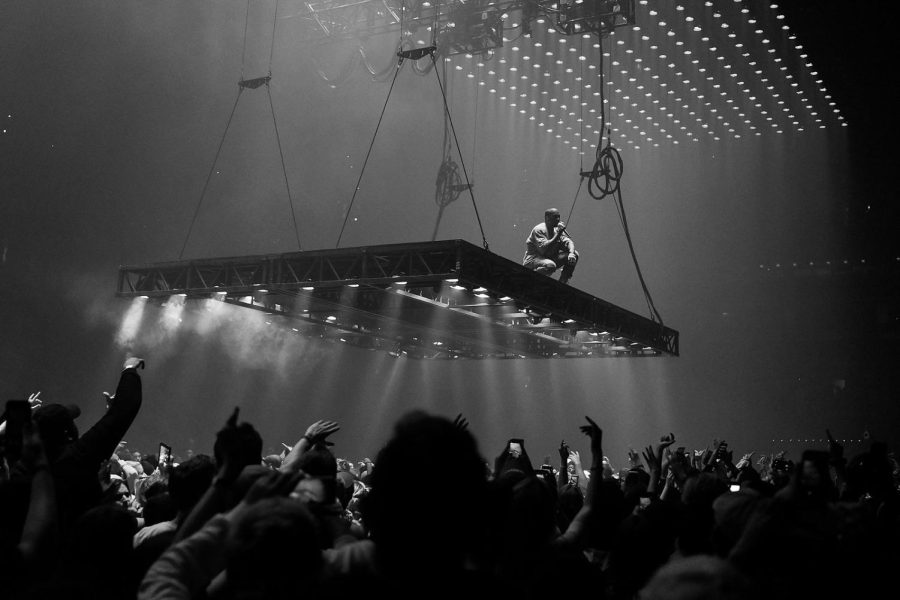Students react to Kanye West’s antisemitic rhetoric
Kanye West performing at TD Garden Sept. 9, 2016 in Boston on the Saint Pablo Tour. “Kanye West Saint Pablo Tour TD Garden 2016 5” by Kenny Sun is licensed under CC BY 2.0.
November 2, 2022
Following two weeks of unrelenting antisemitic remarks, artist Kanye West is running into criticism online and corporate pushback.
Naturally, Northeastern students — on a campus with the 20th-highest Jewish population among private universities — had things to say.
Sarah Popeck, a first-year journalism and data science double major, and Michael Levy, a first-year electrical engineering major, are both Jewish students. They said they were taken aback by West’s hateful tweets, but not surprised given West’s history of antisemitic comments and actions.
“I was just kind of like ‘not again,’” Levy said. “I’m kind of over it at this point. He’s just jumping from group to group to make chaos.”
This is not the first time West has publicly attacked people or groups with prejudiced claims. In 2005, West announced during a live telethon that “George Bush doesn’t care about black people.” More recently, in March, West harassed comedian Trevor Noah on Instagram just days after Noah criticized West’s public harassment of others on social media.
While his remarks were once limited to the online realm, West has become more public with his latest divisive takes through his work. On Oct. 3, West wore a shirt with the caption “White Lives Matter” to a fashion show in Paris, which caused uproar online because the phrase is tied to reactionary racism against the Black Lives Matter movement.
Following the tweets, companies collaborating with West cut their ties with the artist. Longtime Yeezy collaborator Adidas cut ties with West following his antisemitic hate speech online in a severance that could cost West almost $100 million annually.
“We have to acknowledge the financial aspect of having the support of a huge artist where we can’t necessarily blame a company if they do keep them on,” Popeck said. “I think that specifically with Kanye, it’s a better move to cut him off because things like this keep happening.”
Despite West’s antisemitic remarks — which have since inspired further bigotry, like drawing a hate group to Los Angeles Oct. 22 for a demonstration of support for West on a 405 Freeway overpass — Levy said he feels tired, rather than upset, over West’s attempts at grabbing public attention.
“I feel like a lot of people don’t take him seriously,” Levy said. “I don’t think he has the impact that some people that have been removed from social media did have. He’s not really the catalyst for any major tragedy or like any event, really. He’s just spewing whatever he wants.”
In the conversation revolving around controversial artists, there has been a rise in debate over whether people can separate the art from the artist. Michael Magnarelli, a second-year business administration major, has been a fan of West’s music for years. To him, this debate is a no-brainer — it is possible to separate the art from the artist.
“I think they can because it’s not like his songs are just made by him,” Magnarelli said. “There’s so many people that go into working on this as a project, and these people still deserve credit for the amazing music that they make.”
Despite not listening to his music that often, Popeck argued that separating the art from the artist wasn’t as simple as ignoring West’s public rhetoric; rather she called for a greater degree of awareness of his actions and real-world impact.
“I think that if people are going to keep listening to his music, they should at least acknowledge that what he said is wrong — his actions are wrong — and just acknowledge him as a person,” she said.
The internet, Popeck and Levy said, only encourages West as the viral attention his hateful tirades receive triggers the growth of his platform and notoriety — whether positive or negative.
Levy shared what course of action he hopes public figures who hold massive platforms like Kanye West will take: “Ideally, they would all just shut up.”







